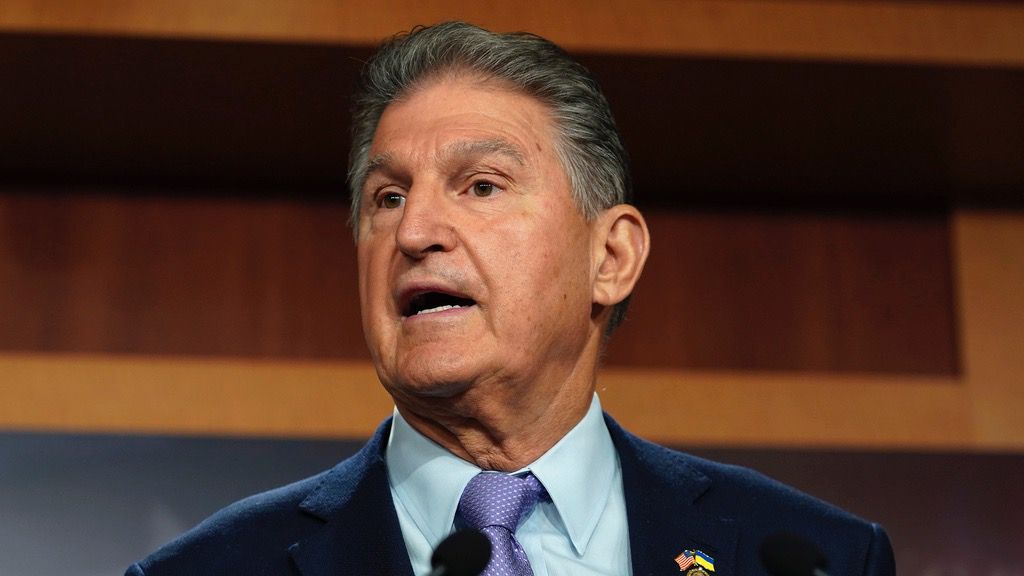West Virginia Sen. Joe Manchin III, a moderate Democrat in a deep-red state who proved to be a pivotal vote – and, occasionally, a frustrating foil – on much of President Joe Biden's legislative agenda, says he's not running for reelection in 2024.
"After months of deliberation and long conversations with my family, I believe in my heart of hearts that I have accomplished what I set out to do for West Virginia," Manchin, 76, said in a video announcement Thursday. "I've made one of the toughest decisions of my life and decided that I will not be running for reelection to the United States Senate."
The centrist Democrat, who has been flirting with the possibility of a third-party presidential run, said he will be "traveling the country and speaking out to see if there is an interest in creating a movement to mobilize the middle."
"When America is at her best, we get things done by putting country before party, working across the aisle and finding common ground," Manchin said in the video. "Many times this approach has landed me in hot water, but the fight to unite has been well worth it."
West Virginia Gov. Jim Justice, a popular figure in the state who once belonged to the Democratic Party, announced he's running for the Republican nomination to represent the Mountain State in the Senate, which would have made for a tough matchup even for the formidable Manchin. Rep. Alex Mooney is also seeking the GOP nomination for Senate.
Manchin's decision makes the 2024 Senate map a much tougher pill for Democrats to swallow. Democrats are on the defensive in Republican-leaning states like Montana and Ohio and in key states President Biden narrowly won, like Wisconsin, Pennsylvania, Nevada and Michigan, with very few, if any, potential pickup opportunities.
"We like our odds in West Virginia," Montana Sen. Steve Daines, the chair of the Senate Republicans' campaign arm, said in a short statement after Manchin's announcement.
Manchin, who previously served as governor of West Virginia, has been a key swing vote in the Senate since he won a special election in 2010 to serve in the upper chamber. He has frustrated his fellow Democrats by opposing expansion of the filibuster – the Senate's 60-vote threshold to pass major legislation – and other progressive priorities like abortion and voting rights legislation, opposed then-President Barack Obama's energy policies, and backed then-President Donald Trump's immigration policies, including the border wall, and some of his key appointees, including Supreme Court Justices Brett Kavanaugh and Neil Gorsuch.
However, he voted against Trump's 2017 Tax Cuts and Jobs Act, opposed his third and final Supreme Court pick, Justice Amy Coney Barrett, and blocked efforts to repeal the Affordable Care Act.
In 2021, when Democrats won control of the 50-50 Senate, Manchin was given a de facto veto over much of Biden's agenda. He also proved to be a crucial negotiator on many of the president's legislative wins, including the landmark $1.2 Bipartisan Infrastructure Law. Manchin also supported Supreme Court pick, Justice Ketanji Brown Jackson, as well as the vast majority of his judicial and Cabinet nominees. As of January, he voted with Biden nearly 90% of the time, according to FiveThirtyEight.
Manchin was courted by many of his Republican colleagues to leave the Democratic Party through the years, particularly in 2021 after he torpedoed the Build Back Better bill – a Biden-backed $3.5 trillion climate change and social spending bill, which was later whittled down by the West Virginia Democrat and Senate Majority Leader Chuck Schumer, D-N.Y., into the Inflation Reduction Act, which Biden signed into law last year.
"The fact is, Joe Manchin should have been brought into the Republican Party long ago," Trump wrote in a Truth Social post last year.
But each time, Manchin held firm and stayed with the Democratic Party, despite clashing with many of its members.



